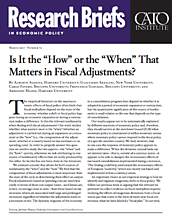The empirical literature on the macroeconomic effects of fiscal policy often finds that fiscal multipliers depend on the state of the economy: whether a shift in fiscal policy happens during an economic expansion or during a contraction makes a difference. Is this the relevant nonlinearity when dealing with fiscal adjustments? Our work studies whether what matters most is the “when” (whether an adjustment is carried out during an expansion or a recession) or the “how” (i.e., the composition of the adjustment, whether it is mostly based on tax increases or on spending cuts). In order to properly answer this question we need to study the two aspects — the “when” and the “how” — jointly, otherwise we risk attributing to one source of nonlinearity effects that are really produced by the other. So far this has not been done in the literature.
We estimate a model that allows for both sources of nonlinearity, the “when” and the “how.” We find that the composition of fiscal adjustments is more important than the state of the cycle in determining their effect on output. Fiscal adjustments based on spending cuts are much less costly in terms of short-run output losses — such losses are, in fact, on average close to zero — than those based on tax increases, which are associated with large and prolonged recessions regardless of whether the adjustment starts in a recession or not. The dynamic response of the economy to a consolidation program does depend on whether it is adopted in a period of economic expansion or contraction, but the quantitative significance of this source of nonlinearity is small relative to the one that depends on the type of consolidation.
Our results appear not to be systematically explained by different reactions of monetary policy and, therefore, they should survive at the zero lower bound (ZLB) when monetary policy is constrained or within monetary unions where monetary policy cannot respond to the fiscal policy of a specific member country. We find, however, that in one case the response of monetary policy appears to make a difference. When the domestic central bank can set interest rates — that is, outside of a currency union — it appears to be able to dampen the recessionary effects of tax-based consolidations implemented during a recession. This finding could help understand the recessionary effects of European “austerity,” which was mostly tax-based and implemented within a currency union.
An important choice in our empirical strategy is how we identify and organize exogenous shifts in fiscal policy. We follow our previous work in arguing that the relevant experiment to collect evidence on fiscal multipliers requires studying the effects of exogenous deviations from a fiscal status quo that come in the form of multi-year fiscal corrections: what we have labeled a “fiscal plan.” In our view, such plans are the correct way to describe how fiscal policy is implemented in real-world situations because governments typically adopt, and parliaments vote on, multiyear budget laws that have little resemblance to the isolated fiscal “shocks” often studied in the literature.
The fiscal consolidations we study are those implemented by 16 Organisation for Economic Co-operation and Development (OECD) countries (Australia, Austria, Belgium, Canada, Denmark, Finland, France, Germany, Ireland, Italy, Japan, Portugal, Spain, Sweden, United Kingdom, and the United States) between 1981 and 2014. We take as our starting point the narrative identifications that earlier work has constructed for these countries; in the narratives, fiscal adjustment are classified as exogenous if they are geared toward reducing an inherited budget deficit or a long-run trend of it (for example, associated with pension outlays induced by population ageing), and if they are motivated by reasons that are independent from the state of the business cycle. Adjustments that instead are motivated by short-run countercyclical concerns are excluded on the argument that they are endogenous in the estimation of their effect on output.
We conclude that what matters for the short-run output cost of fiscal consolidations is the composition of the adjustment. Tax-based adjustments are costly in terms of output losses. Expenditure-based ones have, on average, very low costs: this average may be the result of some cases of expansionary expenditure-based (EB) adjustments and others that are mildly recessionary. The dynamic response of the economy to a consolidation program does depend on whether this is adopted in a period of economic expansion or contraction, but the quantitative significance of this nonlinearity is small relative to the one that depends on the type of consolidation. The role of the ZLB is more difficult to assess, given the low number of observations. However, our (admittedly not conclusive) evidence does not point toward a large difference between episodes at or away from the ZLB, or more generally when monetary policy cannot react to a fiscal adjustment in a monetary union. This is an issue that deserves further research.
NOTE:
This research brief is based on Alberto Alesina, Gualtiero Azzalini, Carlo Favero, Francesco Giavazzi, and Armando Miano, “Is It the “How” or the “When” That Matters in Fiscal Adjustments?,” National Bureau of Economic Research working paper no. 22863, October 2016, http://www.nber.org/papers/w22863.
About the Authors

This work is licensed under a Creative Commons Attribution-NonCommercial-ShareAlike 4.0 International License.
